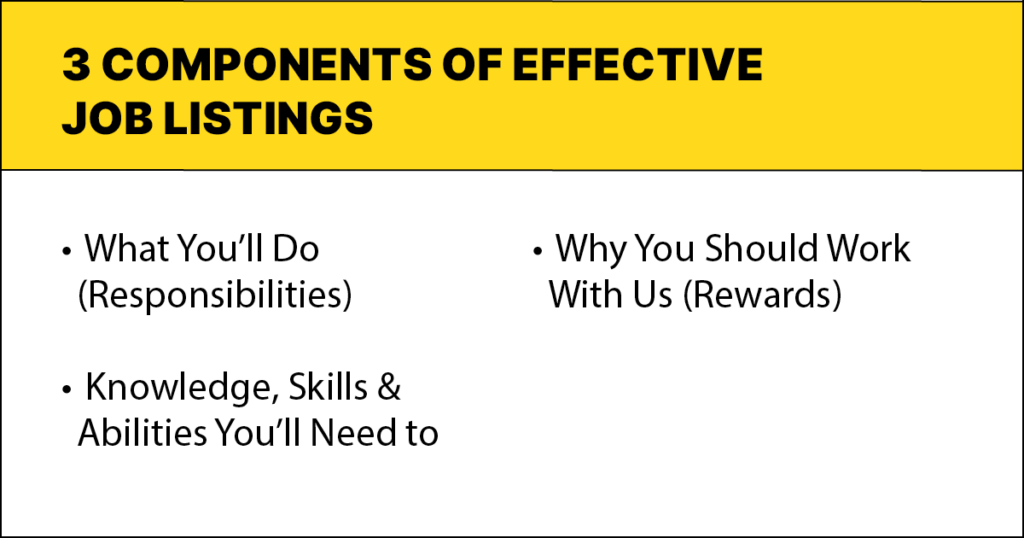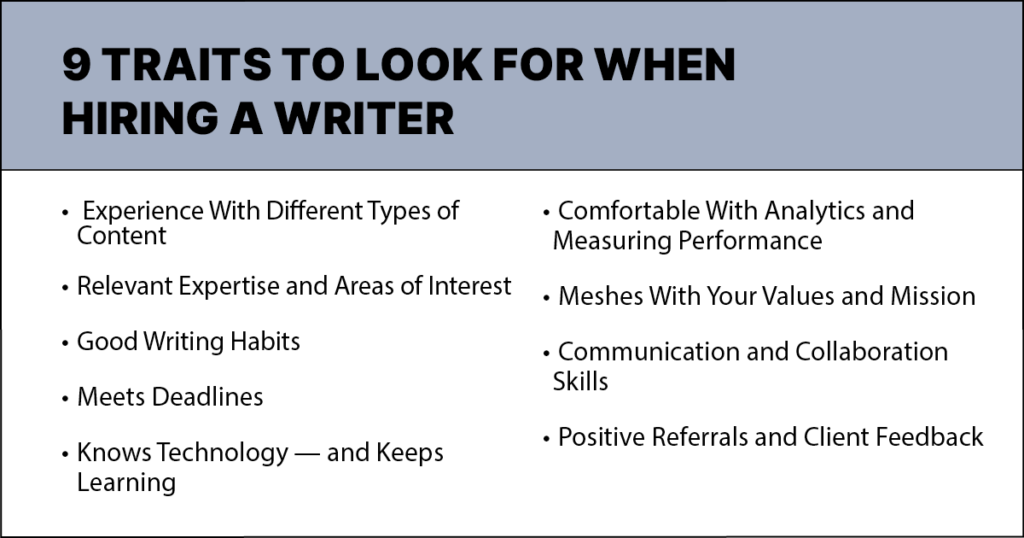Somewhere, someone is staring at their computer screen after completing their ninth job application of the day. They’re skilled, experienced and ready to write the best content you’ve read in years. They could be a perfect fit for your open content writer role. But if you don’t understand how to hire a writer in today’s economy, the two of you might never connect.
The process of hiring a writer is much different than it was just a few years ago. Skills such as prompt engineering and experience working with large language models are becoming an integral part of the job. Analytics and SEO are quickly becoming as important as writing, according to research from Semrush.
While it’s not the first (or last) time recruiting priorities and job qualifications have changed, the core strategy remains: You want writers who share your values, work well with others, have high potential and can help your team achieve its goals.
How do you do that? We’ll walk you through the entire process, including identifying what you want in a writer, where to look, and how to screen and interview candidates.
What Goes Into an Effective Job Description?
Unless you’re hiring from within, your search should begin with a well-written job description that signals to the best candidates precisely what you need. This isn’t a press release or a jargon-filled brand statement. You want a clear, concise description of the skills, experience and job duties. Here are some important considerations for a comprehensive job description.
Focus on the Job Title
This might sound obvious, but you’ll be surprised how many job listings have titles that raise more questions than it answers. Be clear, concise and direct. Avoid cutesy and clichéd titles, like “content ninja” or “rockstar storyteller.” They don’t describe what you need or where this role lives in the company hierarchy. “Senior content marketing writer,” by contrast, gives potential applicants a good indication of the seniority level, department and job role.
If there’s a specific type of writer you need, say so. For example, if you’re a financial services brand wanting to create thought leadership content, ask for a “financial writer” rather than the vaguer “content writer.”
Search on LinkedIn, Indeed and other job websites to see what popular job titles look like. If you can’t figure out the job by looking at another company’s job title, don’t use it for your listings!
Focus on the Three R’s
Once you have nailed down the job title, you have to create the three R’s of the job description — responsibilities, requirements, and rewards.
Responsibilities
What tasks are associated with this role? You don’t have to include everything, but the description should provide a general idea of daily duties and expectations. This is a good opportunity to focus on experience level, too. Think about the specific types of articles, whitepapers, guides and other materials you want this person to create. How difficult will these assignments be? How much of a learning curve do you anticipate?
Requirements
Some writing jobs are for entry-level hires with little professional experience, while others are aimed at seasoned professionals. Use the requirements section of your job description to illustrate the educational and professional experience you’re looking for, as well as certain types of skills, certifications or qualifications.
Keep in mind that the tighter your requirements are, the fewer candidates you’ll have. Be wary of qualifications that potentially introduce bias and reduce your candidate pool. For example, be wary of requiring a college degree by default or seeking several years’ experience for an entry-level job. Strong writing can come from anyone, including people who are switching careers. One way to test candidate aptitude beyond a simple list of requirements is with a test project, which we’ll discuss later.
Rewards
Candidates want to know what you’re giving them in return for their labor — pay, benefits, perks and more. Make sure your job description focuses on tangible rewards and benefits offerings. Highlight anything that’s unique or goes beyond industry standards. But make sure the perks you’re describing are truly perks — features like free snacks and concierge services aren’t a substitute for leave policies or mental health benefits, for example.
Be Transparent
Being upfront about the role is valuable for everyone involved. Will this role be remote, hybrid or in-office? Is your company considering changing its policy? If you’re hiring for freelance writing or part-time work, is there any chance the role could turn into a full-time hire? Whatever the situation, make your expectations clear in the job description.
Many states and local jurisdictions are requiring salary transparency in job postings, so make sure you’re following those requirements. Even if you’re not legally bound to share pay ranges, we’d encourage you to do so.
Put It All Together
Here’s a quick example of what a good B2B content writer job description for a content agency should look like:
Content Marketing Writer
Rep Cap, a B2B content marketing agency, seeks a full-time content marketing writer to write blog, email, social and web copy for our brands and our clients.
The right person for this role will be curious, self-motivated and committed to raising the bar for B2B content marketing in their work.
This is a full-time, mid-career role, reporting to the Senior Content Marketing Manager, with the opportunity to advance and specialize as the agency grows.
Our agency is fully remote, with team members working from their homes throughout the U.S. We’re committed to diversity, inclusion and belonging for all candidates and employees, and we highly encourage applicants from historically excluded groups to apply.
The base salary range is $40,000-$55,000, with the opportunity to earn bonuses based on team and individual performance.
What You’ll Do (Responsibilities)
- Writing blog, email, social and web copy, both under your own byline and ghostwritten for clients.
- Reviewing client content and third-party research as background and source material for your content.
- Interviewing clients, subject matter experts and other sources to gather information for your content.
- Developing topic ideas for articles, blog posts and white papers.
Knowledge, Skills & Abilities You’ll Need to Succeed (Requirements)
- 1 year of experience in a deadline-driven writing role at an agency, brand or media organization.
- Ability to produce content in a variety of formats for multiple brands while allocating your time efficiently.
- Basic reporting and writing skills.
- Knowledge of AP Style.
- Ability to proactively meet deadlines and relay obstacles and barriers to meeting deadlines to team members.
- Ability to communicate and collaborate professionally with clients and colleagues as part of a remote team.
- High level of computer literacy, with a demonstrated interest in learning and mastering new software.
- High level of attention to detail.
- Desire to continuously learn and improve your skills.
The Ideal Candidate Will Have:
- 2+ years of experience in a deadline-driven writing role at a B2B agency, B2B brand or business media organization.
- Demonstrated interest in insurance, financial services or other B2B industry content.
- Basic knowledge of SEO and its application in content marketing.
Why Work With Us (Rewards)
- An opportunity to create content for the brands shaping the conversations about the future of work, finance and sustainability.
- Performance-driven compensation. Comprehensive benefits package, including health insurance, paid parental leave, 401(k) with match, and 5+ weeks of annual paid time off from day 1.
- Flexible, results-driven work environment.
- A commitment to diversity and inclusion, pay equity and organizational transparency.
- Ongoing investment in your learning and development.

Dig Deeper in Interviews to Uncover Potential
Your well-designed job description should generate a lot of interest, especially if you’ve shared it through job boards and other forms of outreach. Now it’s time to screen candidates and interview the most promising. This is your opportunity to meet people and learn about their work history, life experiences, goals, interests and what makes them unique.
Once you’ve used an applicant tracking system or some other tool to narrow your candidate pool, the next step is usually screening calls. They are as simple as a 15-minute phone call to briefly discuss the role, provide an overview of the company and the job, and learn more about each other. Use this opportunity to ask or answer job-specific questions that help the candidate determine whether the role could be a good fit (but be careful not to ask questions that could invite legal liability).
For the candidates who remain after screening calls, schedule an initial interview — often over the phone or via video, but sometimes in person. Some roles may require multiple interview rounds or interviews with multiple parties. If you’re a managing editor, consider including potential co-workers or key people from other departments in these interviews so you get additional perspectives. What’s most important is that you ask questions that help you truly get to know the candidate — and help them understand more about you.
Every content team will have a slightly different process regarding interview questions. Some questions will change depending on your industry, subject matter or the types of content you produce. An editor’s interview questions might include:
- What can you tell me about your writing process?
- What are your areas of expertise?
- What story have you written that you’re proudest of?
- What story have you produced that took the most editing?
- What assignment taught you the biggest lesson, and what was it?
- How can our brand do content marketing better?
- Tell me about a brand’s content marketing you admire?
- What kind of tools and technologies do you use regularly in your work?
Develop a Test Assignment for Finalists
By now, you should have a small pool of finalists, often two or three candidates. Many content marketing teams want to see how their next writer performs, and a test assignment can be a powerful way to find out.
We recommend paying candidates for any work you ask them to do, including writing tests. Work is work, and paying candidates shows up front that you value their time and expertise. One way to approach test assignments is to pay for content that your brand might actually publish.
For example, you might pay a final-stage writer candidate writer to develop three story ideas for the brand. Pick the story idea you like most (or assign them a story you think will be a good test of their abilities) and pay them the standard rate for the article.
This approach works best if you’re producing a lot of content and have the resources to pay candidates. It gives you an excellent sense of how much work it’ll take for a writer to produce a story from ideation to completion. (This is also a good time to make sure your contributor guidelines are up to date.)
If your brand doesn’t have (or won’t approve) funding to pay candidates for test projects, it’s best to focus on the smallest possible request that yields insights. Try asking for a few story ideas or a 250- to 500-word critique of your brand’s content, for example. You might also ask for previous work samples so candidates can demonstrate their track record without performing unpaid labor.
What to Look for When Hiring a Writer
There’s no shortage of content needs, and the job outlook for writers in general is expected to grow at a relatively healthy 4% through 2031. The most important thing is to know what you want in a writer. This knowledge directly informs your job descriptions, interview process, onboarding and, ultimately, the success of your next hire.
Experience With Different Types of Content
To say you’re a content writer doesn’t really narrow it down. That could mean blog posts, social media posts, white papers, ebooks, print magazine features, and countless other types of writing. Ideally, you’ll hire writers who are experienced — or at least comfortable — with creating different types of content and molding their work for the target audience.
For example, if you’re hiring for a role that involves SEO writing, look for someone who can demonstrate their knowledge and experience with crafting effective SEO-optimized messaging. If they can also show business impact, all the better. Such a writer should know how to research and use keywords strategically while optimizing content for readability and user experience.
Relevant Expertise and Areas of Interest
You don’t always want a generalist for a specialist role. Oftentimes, you’ll want to find a writer who has a deep understanding of your subject matter, industry or niche. For example, if you run a company that specializes in creating custom furniture from recycled materials for boutique homes and businesses, you might benefit from a writer who’s knowledgeable about recycling, manufacturing or the furniture industry.
On the other hand, don’t overlook people who are skilled at learning quickly, doing research, asking smart questions and incorporating their learnings into their writing. Many journalists have successfully made the leap to content marketing
Good Writing Habits
Beyond grammar and spelling, writers need a good understanding of tone, voice and structure. Good writers are good researchers who understand the difference between facts and claims — and know when to use each. While every writer needs editing and fact-checking, but when the writing process is efficient and productive, everyone benefits.
Meets Deadlines
Great content marketing teams understand the importance of regular content production and maintaining a calendar — and that requires hitting deadlines. Before hiring writers, make sure that they have a track record of delivering high-quality content on time. And because no production process is flawless, ask them how they handle situations where they are running behind, need more time or are overloaded.
Knows Technology — and Keeps Learning
The tech landscape continues to change quickly. Before hiring a writer, ask what experience they have with content management systems, email marketing tools or other tech. More importantly, ask how they’ve learned such systems in the past and how they’ve adapted to tech changes. The rise of artificial intelligence (AI) will only require more learning and unlearning (don’t worry, we’re getting to AI).
Comfortable With Analytics and Measuring Performance
Content marketing isn’t just about creating content but also measuring performance. Consider job candidates’ comfort level with analytics, dashboards and other aspects of reporting. Look for someone who understands how to track and talk about metrics such as pageviews and bounce rates. And while they don’t have to be salespeople, you want writers who are comfortable considering how their content assignments relate to the business strategy — including conversions.
Meshes With Your Values and Mission
When learning how to manage a content marketing team, you quickly realize how important teamwork and collaboration are. And while culture fit is a flawed concept, you do want writers on your team who understand the organization’s values, mission and brand voice. Hire writers who are eager to work with fellow writers, editors and other teammates to produce the best outcomes. Just make sure you’re not confusing culture-add with culture fit.
Communication and Collaboration Skills
A writer who can communicate their ideas clearly and actively listen to feedback is well-positioned to produce content that meets business needs. Collaboration skills are especially important when working with internal subject matter experts, designers or other brand teammates who shape appealing and informative content.
Positive Referrals and Client Feedback
Positive referrals and client feedback are important indicators of a writer’s skills and work ethic. When hiring a content writer, ask for references from past clients or colleagues. This will give you an idea of how they have performed in previous roles and how they work with others.

How Does AI Affect Who You Hire?
For years, AI has helped content writers with tasks such as editing, proofreading and social monitoring. But AI in content marketing is quickly becoming an indispensable part of the content creation process.
For instance, AI helps content writers identify relevant keywords, create outlines, expand on key points, optimize headlines and even suggest new topics to cover. If you’ve experimented with large language models (LLMs) using tools like OpenAI’s ChatGPT, tools such as Jasper or Writer, or Microsoft’s updated version of Bing, you’ve seen how magical these tools can appear. You might even find these tools intimidating, which is understandable!
Right now, you’re not trying to hire AI to replace writers. What you are doing, however, is hiring writers who are eager and willing to use AI to augment the writing process. AI can automate lower-level tasks so your writers can unlock their unique creativity and critical-thinking skills.
Just as you want writers who are willing to keep learning and to adapt to new technologies, you need to do the same as a content marketing leader. AI is just one of the technologies with the potential to completely change how we think about writing in the coming years.
Building Your Dream Team
How we hire writers has greatly changed in recent years, and AI will continue to keep things interesting. As you try to figure out how to hire a writer who can meet your brand’s needs today, keep your long-term vision in mind.
Don’t rush through your hiring process just to repeat it in a few months. Building your dream team starts with finding people who can grow with your company. Perfect your job descriptions, put a comprehensive, repeatable interview process in place, and look for smart, thoughtful writers who are driven and willing to learn.
Want more content marketing insights from Managing Editor? Sign up for our weekly newsletter.






